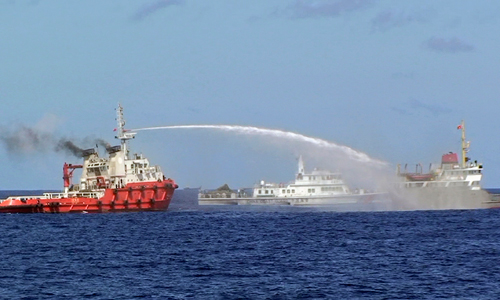
The current tension in the South China Sea triggered by China’s territorial assertiveness underscores the military weakness of the Philippines and the lack of direction of its foreign policy as against Vietnam’s focused moves backed up by a credible defense capacity.
There are three incidents or conflicts going on in South China Sea that have raised the tension to worrisome levels.
One of the incidents involves Vietnam against China over the latter’s setting up of an oil rig in the disputed Paracel islands, 220 kilometers from Vietnam’s shores.
The two other incidents are between the Philippines and China. The first one was the arrest last May 6 by Philippine authorities of 11 Chinese fishermen off Half Moon Shoal (Philippine name:Hasa-Hasa shoal) in the disputed Spratlys area in the South China Sea. Seized with the fishermen were 500 turtles, some already dead. Many of the turtles belonged to endangered species.
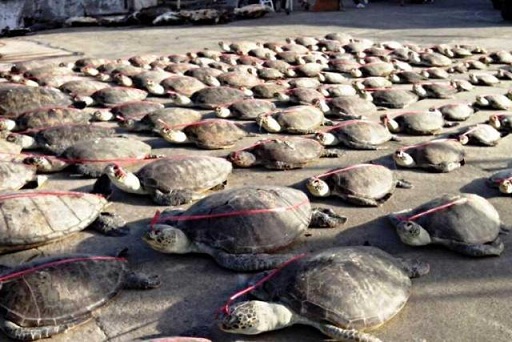
The second issue is the construction by China of what Philippine authorities suspect is an airstrip in Johnson South (Philippine name: Mabini) Reef. In the case filed by the Philippines against China’s nine-dash line map before the United Nations Arbitral Tribunal, Johnson South Reef, 180 nautical miles from Palawan, was among the eight rocks cited as illegally occupied by China. It is also being claimed by Vietnam.
Aside from the Philippines, China,and Vietnam, Malaysia, Brunei and Taiwan also claim some of the islands in South China Sea.
The Department of Foreign Affairs released photos of Chinese installations in Johnson South Reef, which it says, is a violation of the 2002 Declaration on the Conduct of Parties in the South China Sea (DOC) signed by Asean members and China where they agreed to maintain the status quo and not to build new structures in the disputed areas.
The Philippines said the reclamation done by China in Johnson South Reef turned the bean-shaped rock into a 30-hectare (74-acre) land mass.
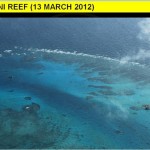
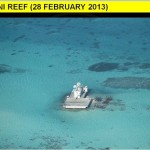
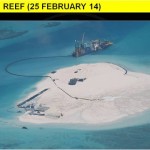
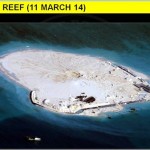
China dismissed the Philippine protest over their Johnson South construction insisting their right to do anything in their own territory. “I wonder what special motives there are behind such concerns by the Philippines,” China Foreign Ministry spokeswoman Hua Chunying said at a news conference in Beijing.
At Halfmoon Shoal, near Ayungin Shoal where BRP Sierra Madre was purposely grounded in 1999 and served as Philippine Marines detachment, China sent two surveillance ships after the arrest of the 11 fishermen. They have not left the area since and are now in control of shoal. Looks like another Scarborough Shoal.
Philippine authorities have advised Filipino fishermen not to venture into the area near Halfmoon Shoal as Chinese authorities might retaliate by arresting them.
Philippine reaction to China’s aggression has been limited to filing diplomatic protests and issuing statements to elicit sympathy from the international community.
Vietnam, meanwhile, took China head on.
China admitted that they were shocked when Vietnam sent their own flotilla of ships and engaged them in a water cannon battle in the high seas.
Vietnam said some 86 Chinese ships plus war planes are guarding the oil rig installations. On their part, Nguyen Ngoc Oai, head of the Fisheries Control Department , said 30 vessels of the fishery control and marine police forces of Vietnam are operating in the area. About 20 Vietnamese fishing vessels are about 20 kilometers from the rig.
Vietnam is demanding that China remove the oil rig from Paracels, site of a violent clash between China and South Vietnam (before the 1975 reunification of North and South Vietnam) 40 years ago which resulted in the sinking of a South Vietnamese warship and death of more than 50 soldiers.
Yi Xianliang, deputy director general of China’s Ministry of Foreign Affairs, admitted to media in Beijing that authorities were “shocked” by the Vietnamese behavior and Chinese vessels are taking measures to protect themselves.
They are now asking Vietnam to stop harassing Chinese personnel in the oil rig to which Vietnam said he “Vietnamese fisheries surveillance force and Coast Guard will make no concession to the Chinese and they will appropriately respond to any violations of Vietnam’s sovereignty.”
Meanwhile, anti-China protests have intensified in Vietnam escalating into riots. Two have been reported killed and 90 injured. The commerce ministers of both countries were reported to have met Friday in Qingdao, China to discuss the hostilities that are affecting Chinese investments in Vietnam.
Despite conflicting claims in the South China Sea, Vietnam and China enjoy dynamic relations.
Last year during Vietnamese President Truong Tan Sang’s visit to Beijing, he and Chinese President Xi Jinping agreed to establish a hotline to prevent maritime disputes from straining diplomatic relations.
Vietnam did not accede to a Philippine request to join in the suit against China before the U.N. Arbitral Tribunal anticipating that if they did so China would immediately move into their land border or occupy rocks or reefs in the Spratlys.
Vietnam’s nationalistic and well-calculated moves have been formed from its painful history with colonial powers.An article by Ngo Minh Tri and Koh Swee Lean Collin, “Lessons from the Battle of the Paracel Islands” in the online publication, The Diplomat, enumerated the valuable lessons they learned from the 1974 Paracels debacle:
One, diplomacy is the first recourse… but not the sole recourse.
Two,extra-regional powers neither always stay… or always ‘Help.’
The authors noted that none of the extra-regional powers has taken any side on the South China Sea disputes, preferring to focus only on freedom of navigation.
They disclosed that in the 1974 clash at Paracels, Saigon sought assistance from the U.S. Seventh Fleet, but it was under orders not to intervene in the disputes and no help arrived.
Three, the need for at least limited sea control capabilities.
The authors said “While diplomacy is the preferred recourse and extra-regional powers have become more heavily involved in the region, adequate military power in the form of defense self-help remains necessary, especially when the area continues to be fraught with uncertainty.”
The Philippines, on the other hand, has not modernized its military, the only coastal state in Southeast Asia without a submarine. Its Air Force is a butt of joke: All air, no force.
Philippine officials also continue to delude themselves and the people that the United States will send their troops in case of an armed conflict with the Chinese in the Spratlys.
Retired Commodore Rex Robles said, “We are paying for years of neglect.”
President Aquino said he will stick to “diplomacy” to solve the current crisis triggered China’s new construction of facilities in the disputed areas in the South China Sea.
It is doubtful if he understands clearly the intricacies of the “diplomacy” he is talking about. He is putting so much hope on the ASEAN Code of Conduct in the South China Sea, which would need China’s concurrence. Diplomatic experts do not see an Asean Code of Conduct in the South China Sea signed in two years time.
Aquino also cited the case filed by the Philippines with the U.N. Arbitral Court to declare as illegal China’s nine-dash line map. But former Ambassador to the United Nations Lauro Baja,Jr, is of the opinion that when the Philippines sued China before a U.N. court,”That was the end of diplomacy.”
Also, the decision on the U.N.case is expected in two to three years. Even if the decision would be in favor of the Philippines, since China refused to participate in the U.N. arbitration, it is not compelled to abide by the decision.
The Philippines and China are also at odds on the form of talks with the latter preferring bilateral talks and the former insisting on a multi-lateral forum involving other Asean members.
Baja said the Philippines’ refusal to talk one-on-one with China is a mistake because there are issues, like Scarborough Shoal, that are bilateral in nature.
“The negotiating table is the greatest equalizer in international relations,“he said, adding that Philippine officials should “Be not afraid.”
“Provided the Philippine Team is fully prepared before they negotiate there is nothing to fear that the other side can take advantage of us. It’s a mental baggage which should be excised now before we are totally paralyzed,” Baja said.
The current crisis in the South China Sea should make Philippine officials see the need for a major overhaul in dealing with the South China Sea problem and attitude towards China. They can take lessons from Vietnam.
I reposted this article with some changes. Sorry that I was not able to copy earlier comments.
Let’s start all over again with this post.
It seems like our country has no plan B and relying solely on the case filled with the UN Arbitral Tribunal. My question is, if ever the decisions favors our country, how can we push out China from the territories we claim as ours? What if the decision is not favorable? It looks like we cannot have 100% of what we think we can. Baja’s suggestion to negotiate bilaterally may be an option. I just doubt if we can be successful considering that the previous administration may have entered a deal with them, giving away access to the spartly’s? in exchange for massive Chinese investments and commissions during those times 9NBN-ZTE, Railways, etc)? if true, did they ever returned some of the tongpats they accepted? Parallel to what Vietnam is experiencing right now when North Vietnam, during the Vietnam War relinquished the Paracel Islands to the Chinese in exchange for war materials and military support, ending the pro American South Vietnam fighting a brief naval war for the Paracels ending with their defeat. The fast track bases agreement we have with the US more likely ended this opportunity. Decisions were made. I guess we have to live with it. Problem is, common people will suffer if this things go out of hand. Our Government relies too much from within as can be seen with the personalities advising and making decision. They cannot even fix problems in governance with which many countries in the world have a handle. They are only good at covering for their fellow dilehensyador at the expense of the people’s future!
There are those who make nasty comments against me in this blog and I have deleted it.
This blog was put up for constructive exchanges. One does not have to agree with my views but the discussion should be civil. No name calling.
I will not allow this blog to be used to malign me. You are free to malign me in your space, not in this blog.
I will not allow this blog to be used to malign me. You are free to malign me in your space, not in this blog. -Ellen
Hahahaha!
Right on, Ellen!
Vietnam has learned the power of water, Pinas the risks of laway! 😀
Nah, Pinas officials has no clue whatsoever of the risks of sumasabog na laway!
I hope Pnoy learns the power of diplomacy, he is like an attack dog whenever he opens his mouth on this dispute.
Di ba, Chi. That’s democracy! #4.
Vietnam has learned the power of water, Pinas the risks of laway! -Chi #5.
Okay ka, Chi ha.
“It is doubtful if he understands clearly the intricacies of the “diplomacy” he is talking about.”
I don’t see the President’s approach as uni-dimensional, but as calculated and careful, putting together the framework needed to abide by the constitutional demand for a peaceful approach while firming up alliances, building military capability, and adhering to a very high-minded principle, that international law ought to be respected. China detests the Philippines because the Philippine approach is calm, rational, and makes China look like an idiot. I think Filipinos ought to be proud of their nation’s approach to this matter, which is, after all, brought on by China’s thuggish theft from the Philippines and other ASEAN states.
The Chinese are coming, the Chinese are coming or was that the Russians are coming, the Russians are coming! Well, once upon a time and recently just now, the Russians been as aggressive as the Chinese, but even the Stubborn Kruschev will come to the table instead of Threatening Fireworks the way the Chinese do…
And Vietnam is taking a calculated Risk hoping that China is all Bluff and hope that it is all Bluff but if it is not, China if it goes to war will do it much different than the Vietnam Experience with the American..and nothing the World can do about it, but watch…
for me it seems that the russians are more aggressive than the chinese. when the chinese starts fomenting internal revolutions as the russians are doing among its neighbors, then pinoys have to really worry. just how imagine many chinese speaking pinoys can be involved. otherwise i agree with mr america that the phil approach is sensible.
@#11 Vic
Next week, magkikitakits ang mga lider ng Russia at Tsina. Maaring ang usapan ay tungkol sa pangangalakal. Matatandaan na may economic sanctions ang tropang G7 laban sa Russia. Sa date ng Tsina at Russia, nakisama din ang mga Iranians. Malamang magiging matalik na magka kabarkada ang mga ito.
@# 13 Juan, They might be discussing Free Trade or some trade arrangement among themselves to counter the Sanctions so they can have more room for their newly Formed economic Axis to expand into more military adventures…but these countries do not have the power at the Sea that the Allies have..and the resources, they can not succeed..
Ang kaparaan “back door negotiation” sa Tsina, at pagsunod sa dikta ng “US of A” ng Republika ng Pilipinas, ‘yan ang kaibahan… kumpara sa Socialist Republic of Vietnam.
“We are paying for years of neglect.” – Retired Commodore Rex Robles
Epekto ng kaganapang EDSA1 at EDSA2! at ng kasalukuyang kabulukan ng lipunan (sistema at kultural)
Epekto ng Hello Garci (pagbaboy sa boto) at ng kasalukuyang Napolist (pambababoy sa buwis) = Kataksilan
ph.news.yahoo.com/beijing-sends-evacuation-ships-vietnam-021220227.html
BEIJING (AP) — China on Sunday dispatched five ships to Vietnam to speed up the evacuation of its citizens following deadly anti-Chinese riots over Beijing’s deployment of an oil rig in waters claimed by both countries.
—
This is not a good development after the ‘water’ fight between China and Vietnam.
Nagalit na ang Vietnam sa pambu-bully ng China. Wow, a-tapang ang mga Vietcong. Napaurong nila ‘merika sa gera, baka umurong din Tsina. Away ng dalawang komunista.
Kung walang balls ang Pinas na gawin ito, daanin na lang muna sa diplomasya kesa sa sayang talsik laway.
#16..Are you saying that those people from Cory, Ramos, Arroyo, and Pnoy are the same group of people that lorded over us for decades and that pnoy did not run for president to save us but to save their grip on power and our wealth dahil sa kapalpakan ni arroyo? tsk tsk no wonder marami sa atin hirap na hirap pa rin di tayo kasali sa economic growth ng bansa..kaya pala ang contractualization pinapabayaan, walang tigil na pagtaas ng koryente, tuition fee, lumalalang peace and order, at walang tunay na nakulong na mga kriminal sa pamahalaan…sila naman malapit na makuha buong pinas 5% na lang…dont forget pay yopur toll and tax…lol
#10 Joe America, I agree. The use of diplomatic approach in the current tension in the South China Sea is the only option for PH gov’t to take, for now. It gives the PH the opportunity to build its military capability.
China’s aggressive stance in the territorial disputes in the South China Sea, I believe, is driven by the Chinese desire to outflank the US economy faster than projected. Let us take into consideration the IMF’s prediction that by 2016 or 2019 China will overtake the US economy.
China is trying to agitate her neighbors to create situations in the region that would make countries with alliance to US to cry for help. Any help extended by the US – be it military presence in the region or economic help to her allies would mean further depletion of her economic resources.
China’s calculated moves make the US look insignificant this part of the globe. The moment the Yanks left Subic and Clark, they took Mischief Reef and built a military garrison which was initially a fishermen’ refuge they alleged. Today, as Obama completed his tour of Asia, they immediately buzzed the Japan-administered island dangerously close, they dropped an oil rig near the Paracel greyzone and now they are reclaiming Thomas Reef and are building what looks like a runway.
The Americans respond by calling it “provocation”. Well, I think the provocation was felt more in Washington than in Pnom Penh, Tokyo or Manila. Three battles in proxy within the war of 2 giants.
Who is winning?
Re#1
Banned na naman si Artsee? Lol!!!